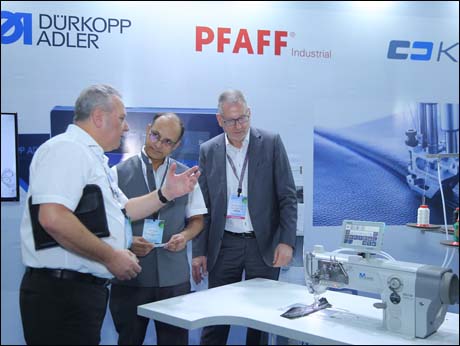
Mumbai, December 15 2019: The 7th edition of Techtextil India, which ended here earlier in the week, witnessed a strong participation of 192 exhibitors from major countries across the world ---and the first ever Hackathon on textiles technologies.
The main event attracted 4,446 visitors from numerous cities like Ahmedabad, Bengaluru, Chennai, Hyderabad, Kolkata, Pune, Raigarh, and Mumbai. Visitors from international countries like Canada, Dubai, Germany, Italy, Turkey, UAE, UK and USA gave the show a global feel.
Smart textile machineries, recycled fibres, industrial fabrics, fire retardants, industry wearables, and other sustainable solutions were among some of the key highlights on the show floor. Among the areas discussed during the B2B event, the exhibition focused on recent technical advancements, all-round growth, sustainability, and reusability of materials in technical textiles.
The cotton industry received a great impetus at Farmers Conclave, as a generous yield of high-in-demand clean cotton marked a big-time success of Pradarshan Khet Project, Aurangabad, a symbolism of revival of clean cotton production in India. The usage of right quality seeds and methods, coupled with a proper amount of fertilisers and adequate water supply extruded from borewell and trenches, enabled the farmers in Aurangabad to grow a lush of clean cotton on what was considered, a barren land.
Discussed at the symposium were, various challenges, innovations, and a keen focus on integrating networks between the 12 dispersed application areas of technical textiles. The seminar aimed fostering sustainability, durability, and functionality through the greater use of renewable natural fibres, rather than synthetic ones. With an aim to curb pollution levels through technical textiles, a newer model of coating machinery was introduced during the seminar, a multi-operation machinery performing all 6 coating functions in a single unit, was greatly applauded as a means to conserve higher usage of energy while constraining pollution.
The first-ever Techtextil Hackathon was attended by noteworthy professionals from various branches of technical textiles. The Hackathon proved to be a great platform for interaction and mutual sharing of versatile experiences concerning the prevailing condition of the technical textile industry.
Sector-specific problems were discussed with a key focus on replacing industry-processed pollutive materials with bio-degradable eco-friendly composites, which were commonly appreciated in the forum as a cleaner, cheaper, and more sustainable alternative. A few ‘green’ solutions mentioned during the forum were: Nasal filters made with nanofibers in highly-polluted cities, plantable sanitary pads, including insights on using waste plastic as composites for recycle and re-manufacture of technical textiles.
The next edition of the show, scheduled from 1- 3 September 2021 is expected to make an even greater and dynamic impact across every segment of technical textiles industry.